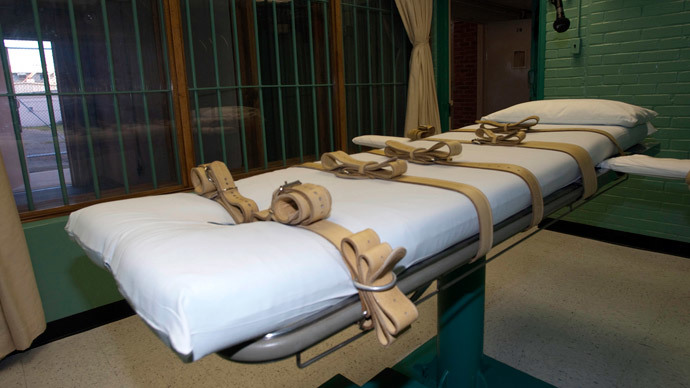Supreme Court to review Oklahoma execution procedure after botched lethal injection

The US Supreme Court announced Friday that it will review the execution procedure used by Oklahoma after the state used a controversial lethal injection cocktail to put an inmate to death earlier this month.
According to the lawsuit filed by three death row inmates, Oklahoma’s lethal injection combination violates the Eighth Amendment of the Constitution, which protects Americans from cruel and unusual punishment. The inmates argue that the sedative midazolam, which is used by Oklahoma during executions, is not strong enough to knock inmates completely unconscious and protect them from pain, Reuters reported.
Additionally, the lawsuit states that since midazolam is not considered effective enough to use in surgery, it should not be used for lethal injections.
READ MORE:‘My body is on fire’: Oklahoma proceeds with executions using controversial method
As the Supreme Court reviews the case, it will decide whether the state’s lethal injection procedure does indeed violate inmates’ constitutional rights.
“We are pleased that the court is going to review this case,” said the inmates' attorney, Dale Baich, to the Guardian. “There has been a dramatic shift in how the states carry out lethal injections since the last time the court looked at this issue.”
All three inmates are scheduled to die before the Supreme Court hears arguments in the case, and Baich said he would seek stays of execution until a verdict is rendered.
The lawsuit was originally filed by four inmates, but one of the men – Charles Warner – was executed on January 15 after the justices voted 5-4 to allow the lethal injection to proceed.
All of the plaintiffs in the lethal injection case just taken by SCOTUS are scheduled to die before arguments. http://t.co/d4wGjVwggq
— Andrew Grossman (@A_Grossman) January 23, 2015
During that execution, Warner declared that his “body is one fire” and that “no one should go through this” before he died. The lethal injection process took about 18 minutes to complete – longer than is typical for this type of procedure – though he did not show physical signs of pain. Some witnesses said that the back of Warner’s neck twitched for about seven minutes before he died.
Warner was originally convicted of raping and murdering an infant in 1997.
Although midazolam is just one of the three drugs used by Oklahoma, it has come under fire ever since the botched execution of inmate Clayton Lockett. Back in April 2014, Lockett was executed in a procedure that took almost one hour to complete, eventually succumbing to a heart attack. Those administering the drugs were found to have injected more midazolam than was necessary, and they burst a vein doing it, remaining unaware of just how much of the drugs Lockett’s body had absorbed.
Executions in Oklahoma were effectively shelved after Lockett’s death until Warner was killed in January, as the state decided to increase the amount of midazolam used.
READ MORE:Oklahoma inmate dies after botched lethal injection, 2nd prisoner granted stay of execution
Although the Supreme Court allowed Warner’s execution to take place, Justice Sonia Sotomayor wrote the dissent for the court’s four liberal justices, saying she was "deeply troubled by this evidence suggesting that midazolam cannot be constitutionally used as the first drug in a three-drug lethal injection protocol."
"Petitioners have committed horrific crimes, and should be punished," she wrote."But the Eighth Amendment guarantees that no one should be subjected to an execution that causes searing, unnecessary pain before death."
There has been a greater focus on state execution procedures in recent years, since many of the drugs traditionally used by correctional departments have become difficult to purchase. Pharmaceutical companies in the European Union – from where most of these drugs are procured – have been barred from selling to departments intending to use the drugs in lethal injections. That has left many states scrambling for alternatives.













